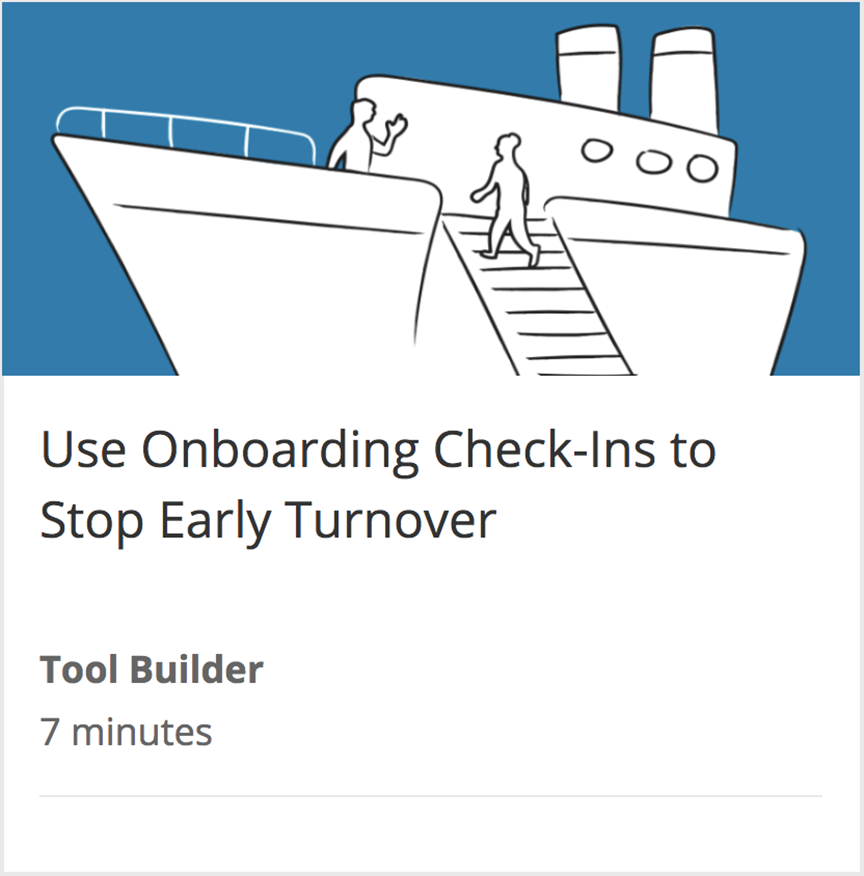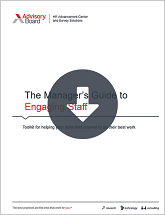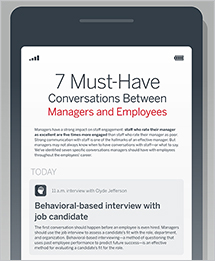Auto logout in seconds.
Continue LogoutEditor's note: This popular story from the Daily Briefing's archives was republished on Dec. 9, 2019.
By Craig Pirner, Managing Director, Talent Development
Recently, I was discussing managers' roles in boosting employee engagement, when one manger posed a challenge: speaking about her organization's bumpy EHR transition, she said, "You know, things around here aren't 'sunshine and roses' right now!" And that got me thinking.
7 must-have conversations between managers and employees
I suspect many health care managers can relate to this conundrum. They wonder how to boost engagement when their organization or department is going through tough times or navigating setbacks: mergers, budget cutbacks, layoffs, disruptive technological change, turnover of key staff, failed projects.
Doubtlessly, it's more fun to make progress on engagement when things are going well. But how leaders handle tough times affects engagement—and if those challenges are handled well they may even provide an opportunity to boost engagement.
The key to navigating those less-than-ideal times: planning thoughtful honest moments. While glossing over setbacks or commiserating about tough circumstances are tempting choices, they can actually amplify the discouragement or isolation your team members may be feeling. Or, it may leave the impression that leadership is avoiding a tough conversation. Most often, silence benefits the leader more than the team.
Find Your Motivation
When tough times threaten engagement, the courage to have an honest conversation is often the first step to maintaining, or even enhancing, engagement. Honest conversations:
- Support your team.A leader who runs to candor about tough circumstances signals that people matter and that the organization takes its goals and performance seriously.
- Foster a positive work culture. Acknowledging tough circumstances and sharing hard truths competes with the rumor mill and demonstrates a commitment to transparency.
- Ease the burden. A team that's informed about tough situations tends to play a role in improving them, easing the pressure leaders may feel to 'go it alone.'
Certainly, honest conversations can involve short-term pain: You'll need to navigate an awkward conversation, deliver bad news, or tell a team that's worked hard that they've still fallen short. But if you view your honest conversation through the lens of one of the above benefits you'll more clearly see the long-term benefit of honest conversations—and that is often the key to finding the courage to endure honesty's short-term pain.
Plan Your Honest Conversation
Once you've found your resolve to have an honest conversation, it can be tricky to know how to begin such a frank talk. To help, we've devised a step-by-step guide.
Before you get started, think carefully about the timing of your discussion. There's no exact timeframe we can recommend, but here are some things to think about:
- Do it soon enough that the issue is top-of-mind for your staff.While honesty at any time is better than nothing, an honest conversation tends to have the highest engagement impact when it's conducted while the issue is fresh.
- But not so soon that you haven't been able to distance yourself from your own emotional reaction. Give yourself the time you need to think rationally and prepare your message.
When you've identified a good moment to have an honest conversation, follow these steps:
- Describe the situation. Take a moment to explain, honestly and clearly, the situation at hand.Challenge yourself to encapsulate the situation in one sentence, e.g., "A change is coming that will be hard." "Despite great effort, we missed our goal." "Our operating margin is lower than budget and prior year." Then, you can provide additional information. When doing so, objective information (e.g., "we need to remove $40,000 in costs from our budget") is better than general information (e.g., "we should expect cost-cutting initiatives")—but don't let not knowing every fact stop you from describing the situation.
- Explain why it's important that the situation be addressed. It's a good idea here to state the obvious: "I am doing this because, even though this is hard, I want you to be informed." We also recommend connecting your conversation to purpose through referencing mission, vision, values, and/or strategy. For example, "While the expansion in our clinic hours may disrupt our routines, it is important for meeting our patient access goals."
- Inject your leadership perspective. Understandably, your team's reaction to tough times may be limited in its scope. For instance, they may be focused only on the immediate consequences or be focused on how the change affects them. As a manager, you likely have insight—either through communications to which you have been directly exposed or through your accumulated experience—that your team has not yet thought about. You might take this time to share the long-term view with your colleagues. For example, "While this technology change will significantly disrupt workflows for now, over the long-term, it will help us automate several costly processes." Or, you might ask your team to consider a broader perspective, e.g., "While losing Jeanne was tough for our department, she has transferred to a team where her skills are really needed right now, and she will make a big difference."Or, you might even invite your team to see potential upsides or opportunities within the change, e.g., "Our patient satisfaction performance is under scrutiny. But, if we can figure out how to do better, we will both get credit for our improvement and be delivering our patients better experiences."
- Offer support. Recognize that this is a tough moment for your team, emotionally and professionally. Offer to support your team in specific ways. For instance, if your team has questions about system-level changes, promise to bring those concerns to senior leaders—and make sure you share leadership's responses! You might set aside time for your team to brainstorm ways you can adjust processes or make improvements. You might also think about having some 'office hours' to answer more personal questions or provide more space for people to seek your perspective and share their own. You might also express your confidence in the team; indeed, sometimes a team's finest moments are borne of rising to the occasion in times of hardship.
So the next time you're facing a situation that's not all 'sunshine and roses,' feel confident in knowing you have the tools—and motivation—to have an honest conversation and to turn tough times into an opportunity to sustain, and even advance, engagement.
7 must-have conversations between managers and employees
Strong communication with staff is one of the hallmarks of an excellent manager. But communication can be an abstract concept, so we've identified seven specific conversations managers should have with employees throughout employees' careers.
Don't miss out on the latest Advisory Board insights
Create your free account to access 1 resource, including the latest research and webinars.
Want access without creating an account?
You have 1 free members-only resource remaining this month.
1 free members-only resources remaining
1 free members-only resources remaining
You've reached your limit of free insights
Become a member to access all of Advisory Board's resources, events, and experts
Never miss out on the latest innovative health care content tailored to you.
Benefits include:
You've reached your limit of free insights
Become a member to access all of Advisory Board's resources, events, and experts
Never miss out on the latest innovative health care content tailored to you.
Benefits include:
This content is available through your Curated Research partnership with Advisory Board. Click on ‘view this resource’ to read the full piece
Email ask@advisory.com to learn more
Click on ‘Become a Member’ to learn about the benefits of a Full-Access partnership with Advisory Board
Never miss out on the latest innovative health care content tailored to you.
Benefits Include:
This is for members only. Learn more.
Click on ‘Become a Member’ to learn about the benefits of a Full-Access partnership with Advisory Board
Never miss out on the latest innovative health care content tailored to you.



